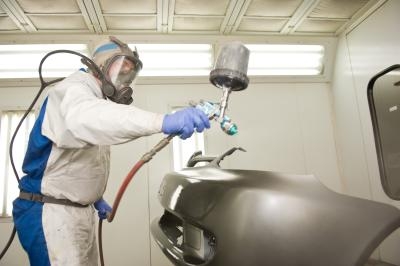
Paint a car without wearing suitable respiratory equipment, and you could end up paying for your negligence with poor health in the future. The dangers of using two-pack paints in the automotive industry have been well-documented in recent years, and strict legislation is now in place to control the release of volatile organic compounds (VOC). Employees who paint cars in body shops, and auto enthusiasts who complete projects at home, should never consider spraying a car without a protective mask in place.
Isocyanates are highly reactive chemicals that have a low molecular weight. These qualities allow isocyanate products to be sprayed as a mist or vapor and they are commonly used in a variety of industry processes. Direct contact with the skin can cause irritation, but isocyanates are at their most dangerous during application. Two-pack paint products contain harmful isocyanates that irritate the membranes of the eyes and damage the gastrointestinal and respiratory tracts. Users of isocyanate materials become sensitized, and this can cause ailments such as asthma if exposure to isocyanates occurs in the future.
Modern body shops use respiratory equipment to protect their workforce from the dangers of isocyanate poisoning. The most common form of personal protection equipment is an air-fed mask, which feeds a controlled supply of clean air to isocyanate users while spraying is in progress. According to a report by the Health and Safety Executive published in 2009, sprayers are 80 times more likely to develop asthma than a worker in any other environment, and this makes mask use mandatory.
Early signs of isocyanate damage can include red eyes that continually water because the membranes have been eroded. Workers will often experience coldlike symptoms including deep coughing and a runny nose. The chest will often feel tight, even when a worker is at home, and breathlessness and wheezing can occur when the worker is resting or sleeping. As exposure to isocyanate materials increases, the symptom become progressively worse until the worker develops severe asthma, which is incurable.
The effects of isocyanates over a longer period time are more severe. Workers often find that they have to leave their jobs because they fail mandatory lung tests, and this can result in financial hardship if alternative employment cannot be found. For many, the effects of isocyanate poisoning become more concerning as they get older, and many former paint sprayers have to use ventilator equipment to breathe more easily. In some cases, the effects of isocyanates can even be fatal.